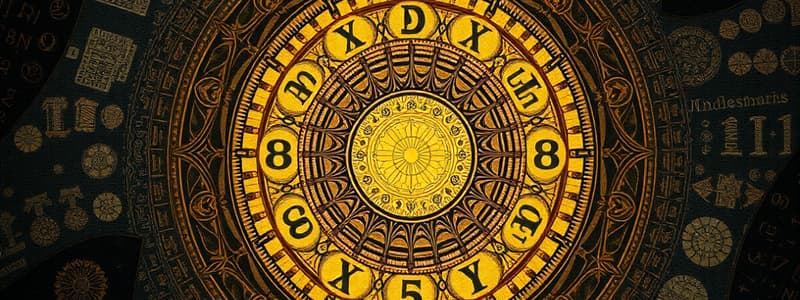Podcast
Questions and Answers
What is the primary focus of discrete mathematics?
What is the primary focus of discrete mathematics?
- Studying the relations between different mathematical theories
- Analyzing continuous data distributions
- Objects that can be counted or enumerated distinctly (correct)
- Modeling real-world phenomena using differential equations
Which concept is NOT a fundamental notion of set theory?
Which concept is NOT a fundamental notion of set theory?
- Differentiation (correct)
- Union
- Complement
- Intersection
What is a significant application of discrete mathematics?
What is a significant application of discrete mathematics?
- Quantum physics modeling
- Financial analysis and statistics
- Graph theory in network analysis (correct)
- Calculus for continuous change
Which of the following is an essential aspect of logic in mathematics?
Which of the following is an essential aspect of logic in mathematics?
Which of the following accurately describes inferential statistics?
Which of the following accurately describes inferential statistics?
Which branch of mathematics deals with the study of rates of change?
Which branch of mathematics deals with the study of rates of change?
What is a fundamental property of numbers that allows for rearranging numbers in an addition operation?
What is a fundamental property of numbers that allows for rearranging numbers in an addition operation?
What do we call combinations of variables and constants connected by mathematical operations in algebra?
What do we call combinations of variables and constants connected by mathematical operations in algebra?
In geometry, what term describes figures that have the same shape but different sizes?
In geometry, what term describes figures that have the same shape but different sizes?
Which of the following involves collecting, analyzing, and interpreting data?
Which of the following involves collecting, analyzing, and interpreting data?
What is the primary focus of integral calculus?
What is the primary focus of integral calculus?
What is the proper order of operations for solving mathematical expressions?
What is the proper order of operations for solving mathematical expressions?
Which statement correctly describes mathematical reasoning?
Which statement correctly describes mathematical reasoning?
Flashcards
Mathematics Definition
Mathematics Definition
A formal system of logic for studying quantities, structures, space, and change.
Arithmetic Definition
Arithmetic Definition
Branch of math focusing on basic operations with numbers.
Algebra Definition
Algebra Definition
Uses variables to represent unknowns in equations.
Geometry Definition
Geometry Definition
Signup and view all the flashcards
Calculus Definition
Calculus Definition
Signup and view all the flashcards
Probability Definition
Probability Definition
Signup and view all the flashcards
Statistics Definition
Statistics Definition
Signup and view all the flashcards
Fundamental Operations
Fundamental Operations
Signup and view all the flashcards
Order of Operations
Order of Operations
Signup and view all the flashcards
Variables
Variables
Signup and view all the flashcards
Descriptive Statistics
Descriptive Statistics
Signup and view all the flashcards
Inferential Statistics
Inferential Statistics
Signup and view all the flashcards
Discrete Mathematics
Discrete Mathematics
Signup and view all the flashcards
Combinatorics
Combinatorics
Signup and view all the flashcards
Graph Theory
Graph Theory
Signup and view all the flashcards
Set Theory
Set Theory
Signup and view all the flashcards
Logic
Logic
Signup and view all the flashcards
Mathematical Structures
Mathematical Structures
Signup and view all the flashcards
Recursion
Recursion
Signup and view all the flashcards
Set Operations
Set Operations
Signup and view all the flashcards
Study Notes
Fundamental Concepts
- Mathematics is a formal system of logic used to study quantities, structures, space, and change.
- It encompasses various branches, including arithmetic, algebra, geometry, calculus, and more.
- Mathematics uses symbols and rules to represent and manipulate abstract concepts.
- Mathematical reasoning involves deductive and inductive arguments to establish truths and solve problems.
- Mathematical objects can be concrete (e.g., numbers, shapes) or abstract (e.g., sets, functions).
Arithmetic
- Arithmetic is the branch of mathematics dealing with basic operations on numbers.
- Fundamental operations include addition, subtraction, multiplication, and division.
- Operations follow specific rules, such as the order of operations (PEMDAS/BODMAS).
- Number systems, like integers, rational numbers, irrational numbers, and real numbers, are important components.
- Properties of numbers (commutative, associative, distributive) simplify calculations.
Algebra
- Algebra involves the use of variables to represent unknown quantities.
- Equations and inequalities are used to express relationships between variables.
- Solving equations involves manipulating them to isolate the unknown variable.
- Algebraic expressions are combinations of variables and constants connected by mathematical operations.
- Manipulating formulas and finding solutions for unknown variables are key skills.
Geometry
- Geometry deals with shapes, sizes, and positions of figures in space.
- Basic shapes, like points, lines, angles, and polygons, are fundamental.
- Geometric figures can be 2-dimensional (e.g., squares, circles) or 3-dimensional (e.g., cubes, spheres).
- Relationships between shapes and their properties (e.g., congruence, similarity) are studied.
- Geometry uses theorems and postulates to deduce new facts and solve problems.
Calculus
- Calculus is a branch of mathematics focused on change and motion.
- Differential calculus deals with rates of change, using derivatives.
- Integral calculus addresses accumulation of quantities, using integrals.
- Applications in physics, engineering, and economics are significant.
- Concepts like limits, continuity, and derivatives are core to calculus.
Probability and Statistics
- Probability deals with the likelihood of events occurring.
- Statistics involves collecting, analyzing, and interpreting data.
- Probability and statistics are closely related and often used together.
- Descriptive statistics summarize data using measures like mean, median, and mode.
- Inferential statistics uses data to make judgments about populations.
Discrete Mathematics
- Discrete mathematics focuses on objects that can be counted or enumerated distinctly.
- Topics include combinatorics (counting), graph theory (networks), and logic (reasoning).
- Discrete mathematics finds applications in computer science, operations research, and other fields.
- Mathematical structures like sets and sequences have significant application.
- Principles utilized frequently involve recursion and various counting techniques.
Set Theory
- Set theory is a branch of mathematics focusing on sets (collections of objects).
- Fundamental notions like union, intersection, and complement of sets are studied.
- Venn diagrams can illustrate relations between sets.
- Set theory forms the basis for other mathematical fields.
- Importance lies in its ability to model complex systems.
Logic
- Logic involves establishing arguments for validity.
- Different types of logical statements and arguments are assessed.
- Formal systems of logic, like propositional and predicate logic, exist.
- Rules of inference are key to constructing valid arguments.
- Crucial to analyzing reasoning accuracy and correctness in mathematics and beyond.
Studying That Suits You
Use AI to generate personalized quizzes and flashcards to suit your learning preferences.
Description
Explore the foundational concepts of mathematics, including arithmetic and its basic operations. This quiz covers various branches of mathematics and delves into number systems and properties essential for mathematical reasoning. Test your understanding of these core principles.




